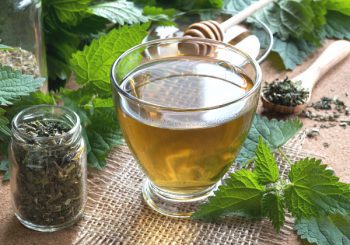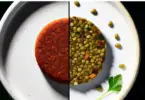Contributing writer for Wake Up World
If you’re familiar with stinging nettle, there’s a high chance that it’s for the wrong reason. If you’re one of the unlucky people who’ve been stung by this plant, you’ve probably vowed to stay away from it forever. However, that might just change as numerous studies show that nettle tea may actually have potential benefits. The only thing is to just make sure you don’t get stung again.
[pro_ad_display_adzone id=”110028″]
What Is Nettle Tea?
Nettle tea is an herbal infusion made from stinging nettle leaves and, in some cases, even its roots. Drinking nettle tea for health purposes has been done for hundreds of years, with early civilizations using nettle to reduce swelling caused by arthritis, and to relieve muscle aches, kidney problems and seasonal illnesses. Nettle’s medicinal properties were especially valued in rural and poor areas because of its availability.1
Nettle offers various nutrients, such as vitamins B, C and K1, plus flavonoids, sterols and carotenoids,2 which make it a worthy herb to add to your diet. It’s even dubbed as a “trophorestorative” herb, meaning it may help repair an organ or organ system. Specifically, nettle aids in restoring the function of your kidneys and adrenals, mainly due to its diuretic properties.3
Nowadays, nettle tea is available in health stores and food shops. There are also infusions that feature other herbs and spices. For additional flavor and nutrition, nettle tea may be brewed with raspberry leaves, lemon balm and alfalfa.4 You may also use fresh leaves if you have a nearby source. Harvesting the leaves may be a challenge, but once you are aware of the plethora of nutrients the plant contains, you’ll know it’s worth it.
5 Benefits You Can Get From Nettle Tea
Nettle tea offers chemical constituents that may benefit your well-being. Some of the health benefits you can get by drinking nettle tea include the following:
- Functioning as a diuretic — A mouse study published in 2000 notes that stinging nettle has diuretic, natriuretic and hypotensive properties at low doses. Higher doses have been found to be toxic, so moderation is advised when drinking nettle tea.5
- Promoting urinary tract health — A 2006 study notes that a combination of sabal palm and nettle helped improve lower urinary tract symptoms in elderly men. A total of 257 patients were tested, wherein half of them received the herbal mixture and the other half received a placebo. Results show that moderate and even severe symptoms were alleviated, with tolerance rated as good.6
- Improving benign prostatic hyperplasia (BPH) symptoms — Studies suggest that nettle may be helpful in managing BPH, a condition wherein the prostate gland is enlarged, causing urination problems.7,8,9
- Helping relieve burns — In a study published in the World Journal of Plastic Surgery, researchers applied nettle extract on mice with second-degree burns. Results indicate that nettle helped speed up healing, suggesting it may be a viable alternative to common treatments such as Vaseline and silver sulfadiazine.10
- Managing inflammation — In a 2012 study published in Phytomedicine, researchers discovered that all parts of the nettle plant (roots, stems, leaves and flowers) contain anti-inflammatory properties.11
Does Nettle Tea Contain Caffeine?
While nettle tea may provide you with an energy boost, it doesn’t contain any caffeine. This means that you can benefit from it without suffering from any of the side effects of caffeinated drinks, which include anxiety, insomnia and a raised heart rate.
You can drink nettle tea in the morning to get that morning kick without the fear of suffering from an energy crash in the afternoon or having problems sleeping at bedtime.12
Brew Your Own Nettle Tea With These Easy Steps
You can brew nettle tea using teabags, dried leaves or freshly cut nettle leaves. If you’re lucky enough to have saved a few nettle plants in your garden instead of plucking them all out, make your way over there now. Just be careful not to handle the leaves with your bare hands. Wear gloves or use tongs to avoid being stung by the small hairs on the stems and leaves.
Once you’ve safely harvested a few cups of nettle leaves, you can now brew your own tea. Here’s a recipe from The Tea Talk you can follow:13
Fresh Leaf Nettle Tea Recipe
Ingredients
- 1 cup of fresh, young nettle leaves
- 2 to 3 cups of water
- Raw honey, optional
Procedure
- Combine all the ingredients in a large saucepan.
- Bring to a boil on a stovetop.
- Reduce heat and let simmer for five to 10 minutes.
- Strain the leaves out and pour into mugs. Serve.
You can also choose to use dried leaves or a nettle teabag. If you’re planning on brewing some with dried tea leaves, here’s a guide you can follow:
Dried Leaf Nettle Tea Recipe
Ingredients
- 1 nettle tea bag or 1 tablespoon of dried nettle leaves
- 8 ounces hot water
Procedure
- Put the teabag or dried nettle leaves in a tea infuser and put it in a mug.
- Pour the hot water onto the cup, and cover.
- Let the tea steep for 10 to 15 minutes. Note that steeping it longer will make the tea stronger.
- Remove the teabag or tea leaves and enjoy your drink.
How Do You Store Nettle Tea?
Before you think about storing nettle leaves, you should first know how and when to harvest them. Nettle tea enthusiasts note that nettle leaves are best harvested young. If you’re planning on using the leaves for tea, pick the leaves before they start producing flowers.
Make sure you wear protective gear, like long-sleeved clothing, long pants and work gloves. While the precautions may seem like a bit of a hassle, rest assured the benefits nettle tea offers are worth the extra struggle. Here’s a guide on cutting nettle leaves:14
- Place your fingers on the front and back of the leaf and cut the stem.
- Choose the top leaves of the nettle plant.
- After you’ve harvested enough, place them in a colander and run cold water over them to remove dirt.
You can keep your freshly harvested nettle in your refrigerator’s vegetable drawer for about two to three days. You can also dry nettle leaves for better storage by using a dehydrator or hanging them up. You can follow these steps from Getty Stewart to dry your nettle leaves successfully:15
- Tie five to six stems of nettle with a kitchen string. Make sure that you don’t tie too many branches together as this will make them harder to dry out.
- Hang the bundles in a clean, dry and dark area of your house. The leaves may take one to three weeks to dry out, depending on the room’s humidity and the maturity of the leaves you gathered.
- Store the dried leaves in paper bags or sealed glass containers. Avoid using plastic containers as they promote condensation, spoiling your leaves.
Side Effects and Contraindications for Nettle Tea
While nettle tea may provide you with a wide range of health benefits, take note that it can also cause a handful of side effects, especially if it’s your first time to drink it. You may suffer from mild upset stomach, fluid retention and diarrhea. If you chose to use it as a topical solution, nettle tea may cause hives and rashes.16
Aside from these, nettle may interfere with certain medications. If you’re taking any of the following medicines, it’s best that you stay away from this tea:
- Blood-thinning drugs — Nettle tea has high amounts of vitamin K. If you’re currently at risk of blood clots and you’re taking blood-thinning medications to treat a condition, drinking nettle tea may decrease their effects, as vitamin K plays a role in blood clot formation.17
- Medications for high blood pressure — Drinking nettle tea may lower your blood pressure further when combined with medications that manage hypertension.18
- Diabetes drugs — Taking diabetes medications with nettle tea may cause abnormally low blood sugar levels.19 If you’re planning on drinking nettle tea, consult with your doctor to ensure that you’re not unknowingly exposing yourself to hypoglycemia.
Nettle should not be used during pregnancy due to the limited studies examining its safety for pregnant women. Drinking nettle tea during the first trimester may also trigger uterine contractions. This may lead to preterm labor or even miscarriage.20
Additionally, it has been noted that consumption of nettle could cause serious imbalances in electrolytes.21
Sip on Nettle Tea to Get a Health Boost
Nettle may not be one of the most loved herbs in the world, but it surely compensates through its nutrients and potential benefits. Behind its rough exterior, nettle can actually offer you some health benefits. However, if you’re one who just doesn’t want to risk getting stung, the good news is that there are numerous ways you can benefit from this herb, and drinking nettle tea is one of them.
Brewing your own batch of nettle tea is a good way to boost your health, but make sure you’re getting your dried tea leaves, fresh leaves or nettle teabags from trustworthy sources. You should also take note of the numerous side effects of this tea to avoid unexpected complications.
Frequently Asked Questions (FAQs) About Nettle Tea
Q: What is nettle tea good for?
A: Nettle tea has been used for hundreds of years to help treat numerous conditions. Today, studies show that it can help alleviate inflammation, promote urinary tract health and relieve burns. It may also help ease allergies and hay fever symptoms.22
Q: Where can I buy nettle tea?
A: If you cannot freely pick nettle leaves from your backyard, you can buy loose nettle tea leaves or teabags from various food and health stores. There are also online merchants that may just have what you’re looking for. Just make sure you’re getting them from trustworthy and organic sources so you know you’re getting high-quality nettle tea.
Q: Is nettle good for your hair?
A: While there have been no clear studies on the effectiveness of nettle for hair health, this herb is commonly used to treat hair loss. You can either drink nettle tea, or topically apply diluted nettle oil to help strengthen your hair roots.23
Q: How do I dry nettle leaves for tea?
A: You can dry your own nettle leaves by using a dehydrator or hanging bundles up in a clean, dry and dark area of your house. If you do not own a dehydrator, manually drying leaves may take up to three weeks, depending on the temperature of the room and the maturity of the leaves you’ve harvested.24
Q: Is nettle tea safe during pregnancy?
A: Pregnant women are not advised to drink nettle tea as it may cause miscarriage and alter the menstrual cycle.25
Q: How much nettle tea can I drink?
A: It’s best to consult a health practitioner to determine the correct amount of nettle tea you’re permitted to drink per day.
Q: Does nettle tea have caffeine?
A: Nettle may have energy-boosting properties, but it does not contain any caffeine. Caffeine-sensitive people may drink this tea without the risk of any caffeine-related complications.26
Sources and References:
- 1 Herbal Legacy, Stinging Nettle
- 2 USDA, Stinging Nettles
- 3, 21 Urologic Nursing October 2005
- 4 The Spruce, Brewing the Health Benefits from Nettle Tea
- 5 Journal of Ethnopharmacology, 2000 Nov;73(1-2):95-100
- 6 Urologiia, 2006 Mar-Apr;(2):12,14-9
- 7 Inflammation & Allergy Drug Targets, 2012 June;11(3):207-21
- 8 Informed Health Online, January 25, 2018
- 9 Der Urologe. Ausg. A., 2004 Mar;43(3):302-6
- 10 World Journal of Plastic Surgery, 2015 Jan;4(1):23-28
- 11 Phytomedicine, 2013 Jan 15;20(2):143-147
- 12, 26 MindBodyGreen, What To Drink Every Morning For All-Day Energy and Vitality
- 13 The Tea Talk, How to Make Nettle Tea
- 14 Wolf College, Stinging Nettle: Harvesting, Processing and Recipes
- 15, 24 Getty Stewart, How to Harvest, Dry, Freeze and Use Stinging Nettle
- 16, 20, 22, 25 PennState Hershey, Stinging Nettle
- 17 Cleveland Clinic, December 3, 2015
- 18 Journal of Translational Medicine, 2016;14(1):254
- 19 Journal of Ethnopharmacology, 2003 Nov;89(1):47-53
- 23 StyleCraze, 21 Amazing Benefits of Nettle Leaf for Skin, Hair and Health
Recommended articles by Dr. Joseph Mercola:
- Mind to Matter: How Your Brain Creates Material Reality
- Breathwork Helps Tame Stress, Benefits Mind and Body
- More Evidence Supports Benefits of Medicinal Mushrooms
- Practicing Gratitude During the Covid 19 Pandemic
- Here’s What You Should Know About Pumpkins
- Drinking Green Tea, Coffee Linked to Lower Mortality
- The Interconnectedness Between Anxiety and Inflammation
- What Can Olive Leaf Extract Do For You?
- Beets for Better Lung Efficiency
- The Little Known Sordid History of Psychiatry
About the author:
Born and raised in the inner city of Chicago, IL, Dr. Joseph Mercola is an osteopathic physician trained in both traditional and natural medicine. Board-certified in family medicine, Dr. Mercola served as the chairman of the family medicine department at St. Alexius Medical Center for five years, and in 2012 was granted fellowship status by the American College of Nutrition (ACN).
While in practice in the late 80s, Dr. Mercola realized the drugs he was prescribing to chronically ill patients were not working. By the early 90s, he began exploring the world of natural medicine, and soon changed the way he practiced medicine.
In 1997 Dr. Mercola founded Mercola.com, which is now routinely among the top 10 health sites on the internet. His passion is to transform the traditional medical paradigm in the United States. “The existing medical establishment is responsible for killing and permanently injuring millions of Americans… You want practical health solutions without the hype, and that’s what I offer.”
Visit Mercola.com for more information, or read Dr. Mercola’s full bio and resumé here.








